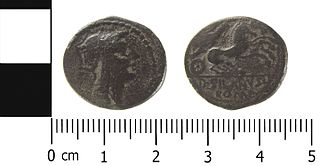Related Research Articles

The gens Livia was an illustrious plebeian family at ancient Rome. The first of the Livii to obtain the consulship was Marcus Livius Denter in 302 BC, and from his time the Livii supplied the Republic with eight consuls, two censors, a dictator, and a master of the horse. Members of the gens were honoured with three triumphs. In the reign of Augustus, Livia Drusilla was Roman empress, and her son was the emperor Tiberius.
Publius Sulpicius Rufus was a Roman politician and orator whose attempts to pass controversial laws with the help of mob violence helped trigger the first civil war of the Roman Republic. His actions kindled the deadly rivalry between Gaius Marius and Sulla, and provided the pretext for Sulla's unexpected march on Rome.
Servilia was a Roman matron from a distinguished family, the Servilii Caepiones. She was the daughter of Quintus Servilius Caepio and Livia, thus the maternal half-sister of Cato the Younger. She married Marcus Junius Brutus, with whom she had a son, the Brutus who, along with others in the Senate, assassinated Julius Caesar. After her first husband's death in 77 BC, she married Decimus Junius Silanus, and with him had a son and three daughters.
Marcus Livius Drusus was a Roman politician who served as consul in 112 BC. He was also governor of Macedonia and campaigned successfully in Thrace against the Scordisci.
Quintus Servilius Caepio was a Roman statesman and general, consul in 106 BC, and proconsul of Cisalpine Gaul in 105 BC. He was the father of Quintus Servilius Caepio and the grandfather of Servilia.
Lucius Licinius Crassus was a Roman orator and statesman who was a Roman consul and censor and who is also one of the main speakers in Cicero's dramatic dialogue on the art of oratory De Oratore, set just before Crassus' death in 91 BC. He was considered the greatest orator of his day by his pupil Cicero.
Marcus Livius Drusus Claudianus was a senator and praetor of the Roman Republic. He was born with the name Appius Claudius Pulcher, into the patrician family of the Claudii Pulchri but adopted by a Livii Drusi as a small child. His daughter Livia Drusilla became the wife of the first Roman Emperor Augustus, and he was a direct ancestor of the Julio-Claudian emperors Tiberius, Caligula, Claudius and Nero.

Decimus Junius Silanus was a consul of the Roman Republic. He may have been the son of Marcus Junius Silanus, consul in 109 BC. He was the stepfather of Marcus Junius Brutus, having married Brutus' mother, Servilia.
Gaius Livius Drusus was a Roman politician who was consul in 147 BC, together with Scipio Aemilianus.
Quintus Servilius Caepio was a Roman patrician, statesman and soldier. He was the son of Quintus Servilius Caepio who was consul in 106 BCE and who lost his army during the Battle of Arausio. He was elected praetor some time in the last 90s BC and fought for Rome during the Social War. He was killed in the second year of the war while fighting the Marsi by Quintus Poppaedius Silo.
Marcus Livius Drusus was a Roman politician and reformer. He is most famous for his legislative programme during his term as tribune of the plebs in 91 BC. During his year in office, Drusus proposed wide-ranging legislative reforms, including offering citizenship to Rome's Italian allies.
Publius Servilius Isauricus was a Roman senator who served as consul in 48 BC together with Julius Caesar. He is generally regarded as a puppet of Caesar, having a long friendship with the Dictator.
Atilia was the first wife of Marcus Porcius Cato Uticensis and mother of his two eldest children.
Servilia was the wife of Quintus Lutatius Catulus, the consul during 102 BC. She was of the patrician Caepione branch of the Servilia gens.
Servilia, also known as Servilia Minor or Servilia the Younger was the second wife of Lucullus.

Caecilia Metella was a Roman matron of the first century BC, who belonged to the powerful family of the Caecilii Metelli. She was possibly the mother of Clodius.

The gens Aufidia was a plebeian family at ancient Rome, which occurs in history from the later part of the Republic to the third century AD. The first member to obtain the consulship was Gnaeus Aufidius Orestes, in 71 BC.
Publius Claudius Pulcher was a son of Publius Clodius Pulcher and his wife Fulvia. He was briefly the brother-in-law of Octavian through Octavian's marriage to his sister Claudia.
Gaius Atilius Serranus was a Roman senator, who served as consul in 106 BC as the colleague of Quintus Servilius Caepio.
Postumia was an ancient Roman woman of the late Roman Republic, she was the wife of Roman lawyer Servius Sulpicius Rufus and a mistress of Julius Caesar.
References
- ↑ Briscoe, John (2019). Valerius Maximus, 'Facta et dicta memorabilia', Book 8: Text, Introduction, and Commentary. Walter de Gruyter GmbH & Co KG. p. 134. ISBN 9783110664331.
- ↑ Treggiari, Susan (2019). Servilia and her Family. Oxford University Press. p. 40. ISBN 9780192564641.
- ↑ Treggiari, Susan (2019). Servilia and her Family. Oxford University Press. p. 39. ISBN 9780192564641.
- ↑ Smith, William, Dictionary of Greek and Roman Biography and Mythology, Vol I (1867). pg. 1077
- ↑ Cicero, Tusculanae Disputationes , V.38
- ↑ Cicero (2018). Tusculan Disputations. Jovian Press. ISBN 9781537824192.
- ↑ Münzer, Friedrich (1999). Roman Aristocratic Parties and Families. Johns Hopkins University Press. p. 287. ISBN 9780801859908.